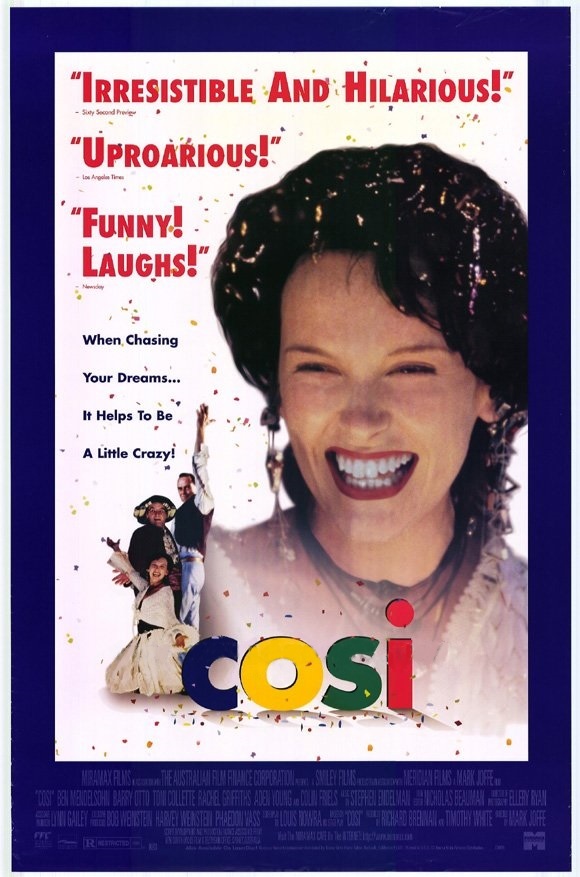

Cosi (Mark Joffe, 1996) wr. Louis Nowra (also play); prod. Richard Brennan, Timothy White; Barry Otto (Roy), Ben Mendelsohn (Lewis), Toni Collette (Julie), Pamela Rabe (Ruth), Jacki Weaver (Cherry), Paul Chubb (Henry), Colin Hay (Zac), David Wenham (Doug), Colin Friels (Errol), Aden Young (Nick), Rachel Griffiths (Lucy), Kerry Fletcher (OT person), Tony Llewellyn-Jones, Robin Ramsay (the Minister); set in asylum; based to some extent on Louis Nowra's own experience - but he produced Trial by Jury
Based on Nowra's own experience working in an institution, this provides an opportunity for great performances from a large number of Australian actors: I think it's David Wenham's best work, along with The Boys. I think Toni Collette is generally thought to steal the film, but others also shine: Paul Chubb and Jacki Weaver especially. The only actor who is no good, as usual, is Aden Young, imo.
Cosi comes perhaps as a middle point to Mark Joffe’s career. Born in Russia in 1956, Joffe immigrated to Australia, and directed two TV series in the 1980s, Carson’s Law (1983) and The Fast Lane (1985). He then went on to direct Watch the Shadows Dance, also known as Nightmaster, in 1986 in the USA, before directing the TV mini-series The Great Bookie Robbery, also in that year. Joffe’s first film was Grievous Bodily Harm, in 1988. After that he directed Shadows of the Cobra, (1989, TV) and in 1990, the TV-screened More Winners: Boy Soldiers. His next film was Spotswood, in 1991. This film is significant because it was also Toni Collette’s first film; it is possible that Collette’s and Joffe’s association in this film may have led to Collette gaining her part in Cosi. After Cosi, Joffe directed The Matchmaker in 1997 and, in 2001, is directing as well as producing the Man Who Sued God. Joanna Ladiges.
There are some very funny moments …The ensemble acting is excellent with too many fine performers to name and praise …Cosi is highly entertaining, a fine example of complete ensemble filmmaking. ... The screenplay attempts some parallels between the central characters’ relationships and the fidelity of the opera’s libretto. This is the least satisfactory aspect of the film. It is not developed and the resolution is too quickly pat. Peter Malone, Cinema Papers, 1996: 41.
Garry Gillard | New: 8 November, 2012 | Now: 2 December, 2019